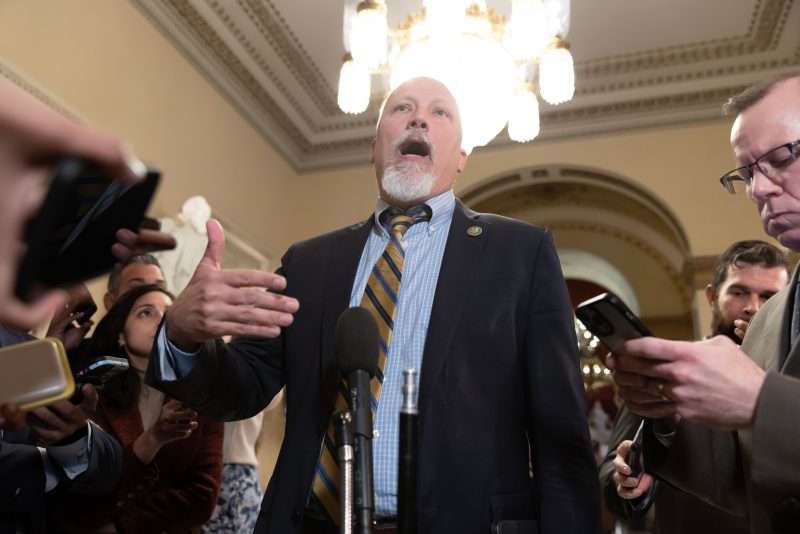In an effort to avert a government shutdown Saturday, House Speaker Mike Johnson (R-La.) has opted to expedite his stopgap funding proposal for floor consideration Tuesday after it became clear Republicans could not pass it through their narrow and divisive ranks.
Hard-right Republicans were planning to sink a critical procedural hurdle, known as a rule vote, that would have blocked passage of the bill because they were angry that Johnson rejected their request to attach spending cuts, border security provisions or funding for Israel to the proposal. Rather than face an embarrassing defeat — Republicans could lose only three votes if all Democrats voted against the proposal — GOP leaders decided late Monday to instead work to pass the package by suspending the House rules. Using the procedural maneuver, however, requires two-thirds support from the House, meaning Republicans will need help from Democrats to pass the legislation.
Once passed by the House, it is expected to clear the Senate, where both Majority Leader Charles E. Schumer (D-N.Y.) and Minority Leader Mitch McConnell (R-Ky.) endorsed the two-tiered plan Monday.
Johnson’s decision to circumvent the far right’s concerns comes after he spent weeks engaging with Republicans across the ideologically fractured conference and producing a compromise proposal that left no faction completely satisfied. The speaker adopted hard-liners’ demand to fund some government departments until mid-January and the rest through early February, and paired the two-tiered deadline with centrists’ request to reject the far right’s push for spending cuts and instead extend existing funding levels until early next year.
“My hope was that he was going to listen to everybody and put something out that was a bit of a bitter pill to swallow, but probably something achievable, to go force pressure on the Senate Democrats,” said Rep. Chip Roy (R-Tex.), who was a proponent of the two-tier approach Johnson adopted but also wanted spending cuts. “I think the Democrat leaders are better playing this game than we are.”
Rejecting demands from the far right, including some in the House Freedom Caucus, incensed many of those members, who got the impression that Johnson would adopt their requests after they praised his first decision as speaker to pass $14 billion in aid to Israel by rescinding appropriated funds to the Internal Revenue Service to pay for it.
“It will be very frustrating and really flies in the face of all that we’ve been fighting for,” said Rep. Andrew Ogles (R-Tenn.), a member of the Freedom Caucus. “I think there’s a real chance that votes going forward could get really contentious, even more so than they are now.”
Asked how the Freedom Caucus would respond if GOP leaders decided to pass the funding bill with the help of Democrats on Tuesday, the group’s chairman Rep. Scott Perry (R-Pa.) said, “It could be rage.”
Frustrated Republicans argued that Johnson’s course of action skirts “regular order,” which would have required the House Rules Committee to adopt a rule that set the parameters of debate for the funding bill’s passage. In retribution, some mused that the group would become more aggressive on sinking future rule votes, mimicking a move they unleashed against then-Speaker Kevin McCarthy (R-Calif.) to express displeasure with his and President Biden’s deal to prevent the country from defaulting on its debt earlier this year.
But unlike McCarthy, far-right members will not make a motion to vacate Johnson from the speakership even though he is deploying the same strategy of overriding hard-liners to fund the government with Democratic support. Roy acknowledged Johnson is in a “tough spot going into” a spending deadline three weeks into his speakership, but his proposal was “the wrong approach.”
House Democrats will meet Tuesday morning to gauge how many lawmakers will support the proposal. Almost 100 more Democrats than Republicans supported McCarthy’s plan to fund the government through suspension in late September.
Some hard-liners have made clear that the honeymoon period they afforded Johnson given the circumstances of his election has ended.
“I think you’re seeing that it’s over,” Ogles said.
Since regaining the majority earlier this year, hard-right Republicans have demanded that GOP leaders adopt significant spending cuts to curb the deficit and have used every fiscal debate to hammer home their requests. Their asks have pushed the rest of the conference to adopt a number of their demands, most notably marking up all 12 appropriation bills funding the government in 2024 to a budget of $1.4 trillion rather than the $1.59 trillion McCarthy and Biden agreed to during the debt fight.
Demanding such steep cuts has tested the conference. Both McCarthy and now Johnson have had to delay consideration of several appropriation bills because of internal fights that have pitted far-right members against conservatives — from those representing rural to moderate communities — concerned with how such reductions would affect their districts. It has contributed to much uncertainty about whether House Republicans can pass all 12 appropriation bills or if they will have compromise with the Senate to fund the government for a full fiscal year.
“I’m not asking you to get everything I want. I’m actually asking to get like one thing I want, one,” Roy said.
Many governing-minded Republicans privately balked at Roy and other hard-liners suggesting that they did not get a win in Johnson’s proposal, given that the speaker adopted their two-date approach, which many lawmakers tasked with appropriations found to be unnecessary. Several lamented that Johnson, though he made the right choice to curb hard-liners in an effort to avert a shutdown ahead of the holidays, will probably face significant rebukes by the Freedom Caucus before the next funding deadline if the current plan is adopted.
“If you can’t pass the rule, you really don’t have a choice,” one moderate House Republican said, speaking on the condition of anonymity to speak candidly. “Next time I doubt they are so generous to the speaker.”
